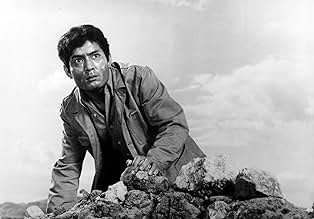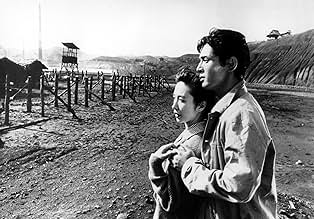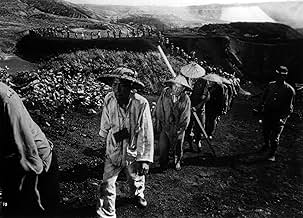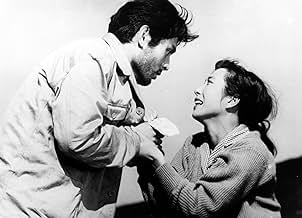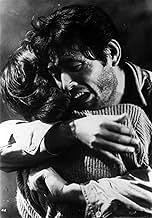La condizione umana: Parte I - Nessun amore è più grande
Un pacifista giapponese, incapace di affrontare le terribili conseguenze dell'obiezione di coscienza, viene trasformato nel suo tentativo di soddisfare le richieste del Giappone in tempo di ... Leggi tuttoUn pacifista giapponese, incapace di affrontare le terribili conseguenze dell'obiezione di coscienza, viene trasformato nel suo tentativo di soddisfare le richieste del Giappone in tempo di guerra.Un pacifista giapponese, incapace di affrontare le terribili conseguenze dell'obiezione di coscienza, viene trasformato nel suo tentativo di soddisfare le richieste del Giappone in tempo di guerra.
- Regia
- Sceneggiatura
- Star
- Premi
- 5 vittorie e 1 candidatura in totale
- Kô
- (as Shinji Nanbara)
Recensioni in evidenza
The films accurately demonstrates, maybe to the extreme, what it is to be a peace-loving, good human being, in a place where fascism and cruelty reigns supreme. Some people may say that Kaji's character is too unbelievable. Too saint-like, to the point where it becomes frustrating. I say it's not true- It's a movie, not real life. Kaji's behaviour might not be realistic, he faces humanity's worst traits with his own altruist ideals of pacifism and equality, as if he's some sort of WW2 superhero. Saying one cannot identify with him is wrong, however, in my humble opinion, because even if maybe you wouldn't act the way he did when put in the same situations, you can appreciate the way he handled himself, you can admire him and aspire to be like him. He isn't a saint though, he makes mistakes, born out of the cruelty and misery that surrounds him, betraying at times the "code" that he is supposed to protect and follow, but even then, you know that ultimately deep down he's the same person, no matter how things go.
Seeing many many irrational things in my military service, I can relate to Kaji in many ways. Seeing people who dedicate their lives to controlling others for the sake of getting promoted, to get appreciated by their superiors who actually appreciate them about as little as they appreciate their own soldiers. People who care for their own interests far more than they care for the interests of those they are in charge of, crushing their wants and needs and deeming them unimportant in the blink of an eye, while their own interests take much higher priority... People who enforce and follow strict rules that are unbending and unreasonable, with such a passion, that it makes you think any reasonable man would dismiss those people as insane, yet still, those are the people who are in charge, because they are the ones who stay in the army and dedicate their lives to it and to it's incredible stupidity, while the real reasonable people go on to dedicate their lives to do something that might actually be beneficial to humanity. This has now officially become somewhat of a rant of how terrible military life and discipline is, maybe more so than it is a review of this series of movies. But why I am saying all of this? because these observations of mine- they are accurately depicted in this movie. If only these real life people that I know were just trying to be a bit better, a bit more human, more like Kaji, maybe my impression of what the army is like wouldn't have been so gloomy as they are now. Kaji, in the films, tries-everywhere he goes-to set things right for those around him, he goes through so many terrible things, scenes that are so... Vile, and so distorted from what you think of human nature as it is in our usually comfortable modern life, and with sheer willpower, he triumphs, even if his triumph is just in him, staying alive while everything else is gone. But ultimately, does it do him any good? If he were to die in the first movie, would that have been better? saved him the suffering of everything he went through later? Well, that is for you to decide. What these films have taught me, is that no matter how it ends, it is important for a person to do what he sees as the right thing to do, and to never lose sight of what the right thing to do is... I'd define a good movie as one that makes you think at the end. It doesn't have to be a cool plot twist at the end that makes you think, it just has to be a movie complex enough but also engaging enough to make you think at the end, because you didn't have time to figure out everything you wanted while you were watching it. At the end of the third movie however, I didn't have to think of anything. I had already absorbed everything. All I wanted was to sleep, and just couldn't. My mind was empty, and I could feel only one thing- awe. And that is why I rate "The human condition" 10/10.
I'm terribly sorry if what you just read sounded like a bunch of drivel. Maybe this review is not for you, and maybe the movie is not for you. But regardless, I thank you for reading it to the very end. Have a nice day.
When he sees the camp, Kaji is angered--the soldiers brutalize the workers and have absolutely no regard for them. The camp is also rife with corruption. He insists that the beatings MUST stop and he is opposed by the staff--but he's not willing to budge and he has the authority to make it stick. Fortunately, when the workers are better few and treated well, production increases dramatically. However, when there are prison escapes, the hardliners press for a return to brutality. After all, they feel, these aren't exactly humans--just Chinese and Korean conscripts and, worse, Japanese political prisoners. What is Kaji to do? As the film progresses, to save himself he may need to forget about his high ideals. But, can he live with himself? And what about his marriage? Because of the job, he's withdrawn and miserable--and a lousy husband. I'd say more, but this would ruin the film.
Overall, an excellent film that is worth seeing. I am excited to see what happens in the second film, as at the end of the first there is a BIG twist and Kaji's world has been turned upside down in the process. My only question is could this film STILL be a bit sanitized? From what I've read about these camps, they were MUCH more brutal than even the film portrayed.
The first part sees Kaji, a young, well-to-do Japanese, begin work as labor supervisor in a POW camp in occupied Manchuria. What could have been an interesting honeymoon with new loving wife Michiko and the start to a promising career slowly devolves into a nightmare: Kaji tries to stay true to his human principles while getting increasingly tangled in a complex web that involves escaping prisoners, abusive guards, and a tyrannical, bullish army that is above the law.
As an indictment of the Japanese Imperial Army, it is all the more haunting for coming from one who served under it. And to Kobayashi's credit, never does this come across as a crass moral lecture. It is a stunning, gripping study in mounting desperation, anchored by a powerful turn from the ever-dependable Nakadai.
Japanese cinema of this period has its quirks, stylish acting and a tendency to melodrama that can bemuse Western viewers. While I find Kobayashi less impaired by these traits than many of his contemporaries – especially in the cold, restrained anger and sorrow of Harakiri, his masterpiece – he gets heroic support from his star of choice. Far from the histrionics and bravado of a Toshiro Mifune, Japan's other megastar of the 50s and early 60s, Tatsuya Nakadai's magnetic charisma is far more subdued and heartfelt. Though our hero is at times unbelievably decent, perhaps buoyed by his youthful optimism and love for his wife, Nakadai makes every situation and painful decision resonate.
The technical credits are the usual for this under-appreciated director's work: arresting visuals, sweeping movement, carefully crafted sets. And the supporting players leave their mark, with a stand-out in each episode. In this instance, particularly Kaji's conflicted assistant, originally mistakable for a simple brute, finds very different ways of dealing with his own crisis of conscience.
This is definitely a film you have to see. Just make sure you clear your schedule, as you don't want to spread the viewing chunks too thin if watching in fragments
While the story has an immediate appeal (or rather connection-to) the Japanese public as a piece of modern history- the occupation/decimation of Manchuria and its people- none of its dramatic or emotional power is lost on me. Kobayashi is personally tied to the material very much (he himself fought in the war and immediately bought the rights to the 6-volume series when first released), but he doesn't ever get in the way of the story. Matter of fact, he's a truly amazing storyteller first and foremost; dazzlingly he interweaves the conflicts of the prisoners (i.e. Chen, the prostitutes, Kao) with Kaji's first big hurdle of conscience at the labor camp as he sees prisoners treated in horrible conditions, beaten, abused, and eventually brought to senseless deaths thanks to Furyua and his ilk, and finds himself brought to an ultimate question: can he be a human being, as opposed to another mindless monster?
Kobayashi creates scenes and moments that are in the grand and epic tradition of movies, sometimes in beautiful effect and other times showing for the sake of the horrors of wartime (for example, there will never be as harrowing an exodus from a half-dozen cattle cars as seen when the Chinese POW's exit from there to the food sacks), and is able with his wonderful DP to make intimately acted scenes in the midst of wide scapes like the outside ore mines and the cramped living quarters or caves. And damn it all if we don't get one of the great scenes in the history of movies, which is when the six "escapees" are put to execution with the prisoners, and horrified Kaji, watching in stark, gruesome detail. Everything about that one scene is just about perfect.
But as the anchor of the piece (and unlike the other two films, he's not even in every scene of this part), Tatsuya Nakadai delivers on his breakthrough performance. Kobayashi needed a bridge between pre and post-war Japan, and Nakadai is that kind of presence. But aside from being an appealing star- the kind you don't want to avert your eyes from- he's mind-blowingly talented be it in subtle bits of business or when he has to go to town in explosive emotional scenes (or, also, just a twitch under his eye in a super-tense exchange). This goes without saying other actors right alongside him- Aratama, Yamamura, Manbara- are perfectly cast as supervisor, prisoner, prostitute, wife alike to Kaji. And yet, for all the praise worth giving to the film, one that gets even better in its second half than its first, this is only the first part!
Lo sapevi?
- QuizAccording to Tatsuya Nakadai, a marathon screening of the entire nine-and-a-half-hour "Human Condition" trilogy is held once a year in Japan, and he has once or twice attended these screenings, which are always sold out.
- BlooperAt one point a Japanese guard begins to whip Kao, yet the motions he makes are just a flailing of his arms, visibly missing the actor. Kao retaliates by throwing a rock at the guard, but the rock never strikes the guard. However, the actor playing the guard overreacts as if he has been struck.
- Citazioni
Kuroki Shochô: You know, Kaji, theory may be correct and yet not always apply to reality.
Kaji: Then either the theory is wrong or it was incorrectly applied.
- ConnessioniFollowed by La condizione umana: Parte II - Cammino verso l'eternità (1959)
I più visti
- How long is The Human Condition I: No Greater Love?Powered by Alexa
Dettagli
- Data di uscita
- Paese di origine
- Lingue
- Celebre anche come
- The Human Condition I: No Greater Love
- Luoghi delle riprese
- Hokkaido, Giappone(Exterior scenes of the Manchurian mine)
- Aziende produttrici
- Vedi altri crediti dell’azienda su IMDbPro
- Tempo di esecuzione
- 3h 28min(208 min)
- Colore
- Mix di suoni
- Proporzioni
- 2.35 : 1


